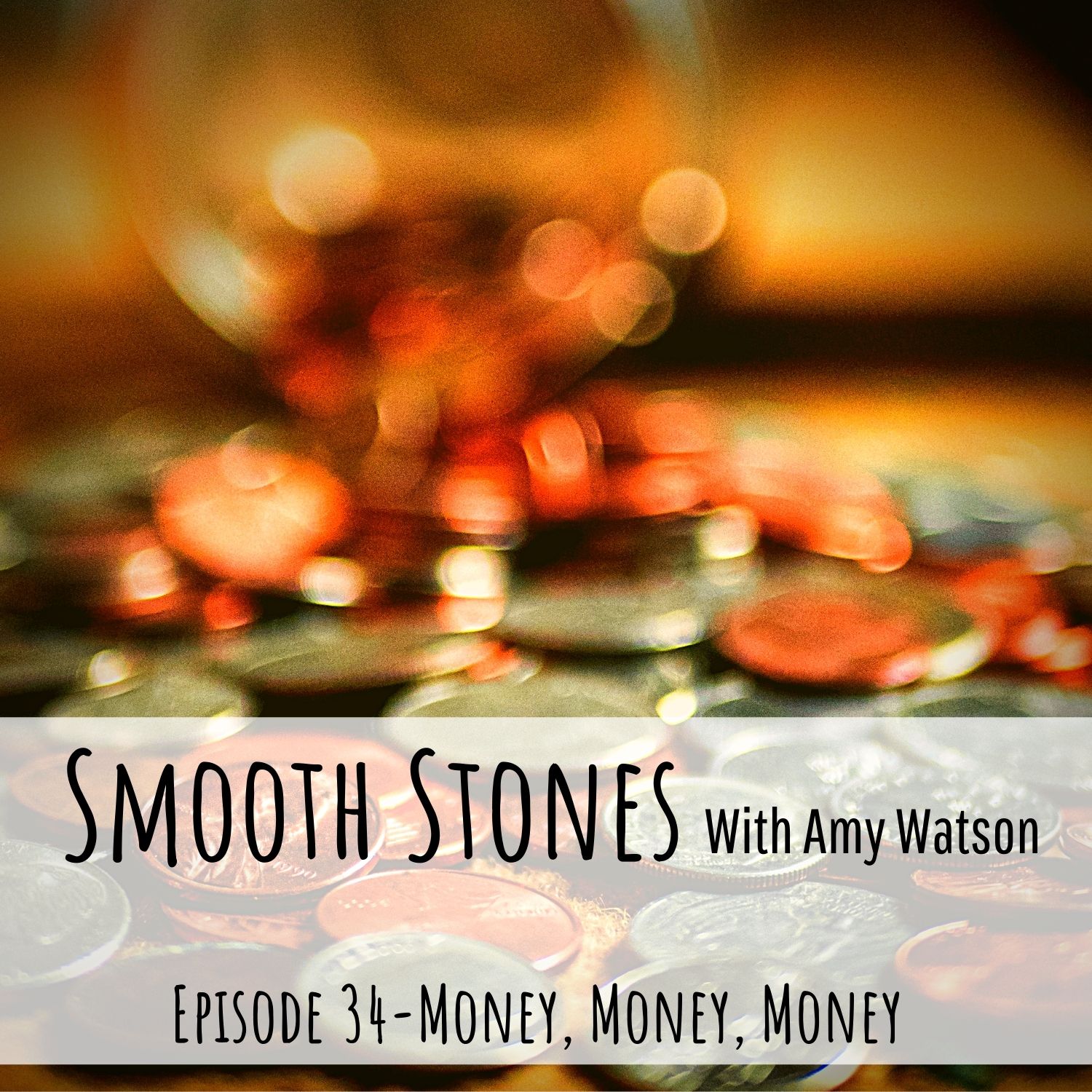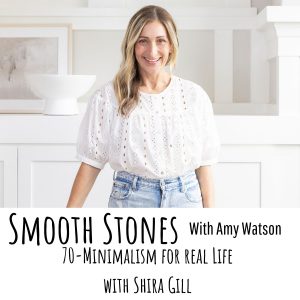Money is something we all deal with every day, but we’re often more comfortable talking about our dead babies than we are about dollars.
Today I’m going to tell you how to find out what you believe about money, and how to move past any blocks that you have so you can create more value in your life.
Money is not evil, money provides freedom and allows us to do so much good.
We don’t have to be afraid of talking about it anymore.
For a free 30 minute session, click here to schedule:
http://smoothstonescoaching.com/free_mini
If you have any questions, let me know here:
http://smoothstonescoaching.com/work-with-me
If you would like to share your baby’s story on the podcast, submit here: http://smoothstonescoaching.com/podcast-submissions
Music provided by ZingDog / Pond5
Photo by Josh Appel on Unsplash
grief, miscarriage, stillbirth, life after loss
Transcription
Hey friends, I am excited to be here as I record this. It is the night before my kids go back to school, my bigger kids, and I love them like crazy and I’m grateful for them. But I’ve got some big things planned for my time. With five of the six children out of the house, it’s gonna be incredibly quiet and I’m kind of excited about it, but I know I’ll.
Probably miss them. So I’m just sending love out to you guys as school starts. I know for a lot of people it can be a really emotional time, and that’s okay. It’s okay if it’s emotional, right? We have these times of year and different things that remind us that our baby isn’t here. And that is okay. Just remember, like we talked about in our last episode, it’s okay to miss them, but just really watch out for that dirty pain and thinking things that really keep you stuck in your grief because it’s hard already.
We don’t have to make it harder. With our thoughts about back to school, I know you guys are doing great no matter where you are. You are exactly where you’re supposed to be, and I’m so grateful that you’re here with me on the podcast. I love getting to talk to you and teach you things, and I love hearing back from you about what you liked, and I would love it if you would let me know what you think about the podcast by.
Giving it a little review. If you’re on iTunes, you can just scroll up on the podcast and there’s like, Little stars and you can write a review. I really, really appreciate it ’cause I’ve put a lot of time and effort into this and I don’t really expect much back. But reviews really help people see that this podcast is really helpful and what you thought about it.
And then they know that it’s helpful for them too. So, Go ahead and do that today. If you can. I would appreciate it forever. This episode is called Money, money, money, money, money. And if you, that might be dating myself a little bit, but who here, watch The Apprentice Back when Donald Trump was like pretty cool and pretty well respected.
But this episode also could be called. Money, money, money, money, money. And that one is from Toy Story One-Eyed Bart. And I think that that’s my favorite thing. I actually can’t say money without thinking Money, money, money, money from Toy Story. But why are we talking about money on a Baby Loss podcast?
Well, if you listen to my first episode, You know that losing a baby is just one part of your story, and unless you are living out in the woods off the grid in some house you made by hand with your own trees, and you’re like somehow listening to this podcast through a tin can. You probably deal with money every day, but most of us do not like talking about money.
In fact, we might be more comfortable talking about dead babies than we are talking about dollars. Have you ever stopped to wonder why that is? Why is it so uncomfortable? Well, we know that our. Emotions come from our thoughts. So what thoughts are you having about money today? We’re gonna dive in and answer this question, but why does it matter?
Well, the way you think about money is going to determine how much money you have. So many people think that money is the root of all evil, right? We’ve all heard that, but. That’s not exactly accurate. If you’re already an evil person, having more money is just going to accentuate that evilness, and you’ll do evil things with the money.
But if you’re already like an amazing, awesome, caring person, having more money is just going to amplify. You being amazing, awesome, and helpful. And you’re gonna be able to do even more with money. ’cause the more money we have, the more fun we can have and the more we can help people. So aspiring to have money actually makes us more of who we already are.
Now you might think the opposite of true that. Pursuing money makes us greedy. Um, that we are gonna have to treat people terribly. That we shouldn’t really try to have wealth or we’re gonna hurt someone on the way. So a lot of people think this and a lot of people really clinging to these beliefs about money, but we can all agree that money does solve a lot of problems.
Everybody in our society needs money. And the more. Money we can create the more we can give and help and support other people. But a lot of us have been taught as we’re growing up that. Money is kind of like a pie, and we each get a piece. And so if we get a bigger piece, that means someone has a smaller piece.
And if you guys listen to the episode on abundance and scarcity, that’s that same idea, right? Like that there isn’t really enough to go around. So if we have more, someone must have less, but that is totally not true. Especially with money, we don’t take money from other people. We create money by creating value.
So if you don’t feel good about your money situation right now, or you don’t feel like you have as much money as you would like, we’ve got to challenge our thoughts around money. Why this matters, especially to us as lost parents, is that we all have. Some extra layers of money beliefs. So some situations I have seen are.
People who run charities or want to do fundraisers, they have a huge heart to do good, but often their beliefs about how much they can do really hold them back. During Covid, I saw a lot of charities who had to cancel their live events and their regular fundraisers that they did, and they had to pivot.
Or maybe they felt like they shouldn’t ask people for money in a crisis. Right. And again, that’s that idea that we shouldn’t take money away from people right now. We also often have maybe funeral costs that last a long time after we’ve buried our baby. Or maybe you don’t have a headstone yet because you really believe that you can’t afford it.
You might have chosen to cremate your baby because it was the cheaper option, and you might have a lot of guilt about that if that wasn’t something you really wanted to do, but you just did it because it’s what you could afford. Maybe people were really generous when you had your loss and set up a GoFundMe or, or really gave to you and.
Now you feel kind of terrible that it seems like you benefited from your baby dying. Um, you might have medical expenses from the care that you received when your baby died. I had a sweet friend who had medical bills that were lasting just. Forever. Every month she was just paying and paying off these bills, and it was just a reminder over and over and over that her babies had died and it was a huge weight on her shoulders and it was really tough for her.
Or maybe you want to do fertility treatments or you want to pursue adoption and money seems just like the hugest block to achieving those dreams of growing your family. And. It’s really frustrating, right? Feeling like. I want to have children, or I want to have more children to hold in my arms and money is stopping me.
Then we have all of our day-to-day money beliefs and we pick them up all throughout our lives. Um, when I help my clients work on this, it’s usually one of our most enlightening sessions. There’s stuff in there, you’ve probably never. Ever realized was in there. But having a coach who asks all the right questions is really gonna help you find those beliefs and find the answers you need.
Really quickly, I want you to think about your childhood. What were you taught directly or indirectly about? Money and this, you could probably fill up a whole page if you really think about it. What money gurus do you follow now, or even if you don’t follow them, I mean, there’s enough quotes and things going around that you probably have heard different financial advisors.
Saying things about what you should do with your money. Who is in charge of the money in your household? Who takes care of the bills, who makes more money if you stay home? Do you believe that your husband or your partner’s income belongs to you? Do you believe that you create that value? And this is something for a lot of stay-at-home moms.
It’s really hard. To wrap their head around. And a lot of times we don’t even realize, uh, what we really think, but I want you to know that you are creating value. If you stay home and you take care of your kids and you take care of the house, you are creating that value that is money that you are making.
It’s really interesting. I had a friend who is also a coach and we were coaching each other and she had a lot of beliefs about her husband because at the time she was home with the kids. She was not working outside the home or bringing in an income, and she felt really terrible about that, that she was building her own business and her husband was paying the bills and.
It was really, really hard for her. What was so interesting to me is that I was in the same situation, so exact same circumstance. My husband was supporting us financially while I was home, taking care of my kids and starting out my coaching business, and I felt so grateful. I felt like I had so much freedom because I knew that.
The bases were covered and I didn’t have to work, but I could work because I wanted to. And so that’s a really great example I think, of how our beliefs about our money really affect how we feel. But my friend was feeling awful, terrible, like really terrible. And I was feeling really grateful. And the only difference was what we thought about our husbands being the breadwinners.
Another question that is really interesting to ask yourself is what do you think about rich people? And really get curious here. Don’t, don’t judge yourself. Just what do you think about rich people? And then what do you think about poor people? I think it would be, Really interesting to also go through this maybe with your spouse if you are brave enough to have money conversations.
I know a lot of people really avoid this, right? But just get curious. Find out how your spouse grew up. Find out what messages they’ve. Picked up along the way. Maybe talk with one of your siblings who grew up in the same house as you and see if they picked up the same money beliefs that you did, or see how they manage the money in their family.
Um, it could be really, really interesting. Another thing to do if you wanna dig a little bit deeper is start by thinking about how much money you have now. Why do you have that amount of money? Now I want you to think about the model. And if you’re not familiar with the model, it’s our circumstances are neutral, then we have thoughts about them.
Our thoughts create our feelings. Our feelings drive our actions, and our actions create our results. So think about your money in the result line. Why do you have that result? How are you creating that in your life? And what if you put some of the thoughts that we’ve just talked about into the thought line, what result are you gonna create?
So a lot of people think like, I don’t have enough time to make more money. Or Money is really hard, or there’s not very much money right now, right? Like the economy is in a crisis and all of those things. I’m never gonna have enough money. I don’t have enough education. I’m never gonna make more in my job.
Like I’m just stuck where I am. I don’t know how to create value. I don’t know how to make money. I am so in debt, I’ll never get out. Right. A lot of people are in that boat, especially like if you have a lot of student debt or. You bought a house in California and the mortgage is just insane, right? You might just have a lot of these thoughts that you’ve never noticed before.
What results are those creating for you? You’ve got to pay attention to these things. Now, I want you to pause right here and notice what are you thinking right now? Are you having some resistance to this idea that your thoughts are creating the amount of money that you have? Right. Well, a lot of us have this story, right?
That it’s not a choice. This is just what happened to us, right? Like it’s all our circumstances. It’s our boss, it’s our job, it’s where we live. It’s the opportunities we have. It’s our whole story of why we have the money we have. But the truth is the amount of money we have is directly related to the thoughts we think about money.
Now, if you are not that one person out in the cabin, in the woods listening on a tin can right now, I’m guessing that you have running water and electricity and the internet, and that’s why money is awesome. Money makes life easier. We think if we have more money, it’s all we’ll think about. But actually the opposite is true.
Money equals freedom. Now the other side of money is allowing ourselves to receive it, right? It’s about being open to receiving money without thinking that that’s a bad thing without thinking that we’re taking from somebody else. It’s about building abundance in your own life so that you can give more and you can be an example and you can serve more in the world.
Like if you. Do have a charity or a business you’re working on, or if you wanna give more value in your job and earn more, do you believe that’s a possibility? Are you even going to allow it if it came to you? When we provide value, we’re going to get value in return. A lot of you might’ve seen like The Secret, or you’ve heard of manifesting or vision boards, and.
It’s not quite that simple, right? I can’t just. Put a picture of a stack of money up on my wall, and it’s just gonna show up on the doorstep tomorrow. Because we know when we use the model that our thoughts are incredibly important. Our belief is super important, but the belief isn’t enough. We have to have the rest of the model.
So we’ve got to create those emotions and we’ve got to take action because action is what’s gonna get us the result. And this is where we want to use the model to create the amount of money that we want. So we need to put our money goal into the result line and then figure out what we need to do, what we need to feel, and what we need to think to get there.
And you need to believe that you’re allowed to put whatever number you want in the result line and not get caught up on. The how now, women tend to be a little bit worse at this. I remember my coach asking me to tell her how much money I would make in my entire lifetime. Has anyone ever asked you that?
Do we ever ask girls that in school? I mean, I don’t think we ask people in general, but especially girls, do we ask them how much they think they’re going to earn? Right? We maybe ask them what they want to be when they grow up or things like that, but we don’t ask ’em how much money they’re gonna earn.
And so it had never even crossed my mind, not once in my life. I, we’ve had our ups and downs like everyone else. But I did have a thought that we always have enough, and I think my husband and I both had that no matter what was going on, we always believed that we were gonna have enough and we always have had enough.
So in that way, we have created our result, which is amazing. But what if it’s okay to want more than enough? Are you willing to do the work to get past your money blocks and create more value in your life? Whether you have a quote unquote Joby your own business, you want a promotion at work, or you have a charity that you really, really want to grow, changing the way you see money will change everything.
Money is just a flow of value. When we stop holding onto scarcity about money, we’ll be ready to allow ourselves to receive it. The power of the self-coaching model works so well on the financial goals. Just like I told you before. Put that number in the result line and fill in the rest and then see what happens.
But we often get caught up in the how. What happens is we also get caught up in the fact that other people have to give us money. Right, that we don’t have control of what they do and we don’t have control of if they buy from us or if our boss will let us have a promotion or all of those things stop us in our tracks.
But I’m telling you, let go of the how. You don’t need to know the how, right? You just have to start with your own beliefs and start moving towards your goal and the how is gonna take care of itself. The takeaways from this episode are this, number one, you have to become aware of your money beliefs.
’cause so many times we don’t even see them. But they’re there and they’re working. Number two, it’s okay to dream big. There is enough for everyone. In fact, the more value you create, the more value you can give, right? The more you grow your business, the more you can hire people and. It just grows and grows and grows.
It’s not the other way around. And number three, you can put any amount of money in the result line and make it happen if you follow through with the rest of your model. And just keep going until you get there. I don’t know how long it’s gonna take you. A lot of us want it to be really quick, right? Quick and easy, least amount of effort to get to our goals.
And that’s the primitive side of us. That’s the side of our brain that wants to stay cozy and warm in our cave. But staying cozy and warm doesn’t really get us anywhere. So you’ve gotta be willing to get a little bit uncomfortable and to not put a timeline on it. Just know that you’re not gonna stop until you get there.
Believe in yourself without knowing all the answers. Now, even in a pandemic, you bring value and you attract value. If you are super stuck in a money rutt right now. In your life, your business, or your charity, I can help. You’re going to be able to hit your goal and even blow way past it 10 times faster with a coach helping you get there, and when you invest in yourself.
The universe pays you back and it’s a most amazing thing. I think we’re really afraid to spend money on ourselves, but just the act of believing in the value of investing in yourself is going to change the way you think about money, and it’s gonna bring a lot more value into your life. I’ve seen it over and over and over.
All right. That’s it for this week. I’ll talk to you next time.




